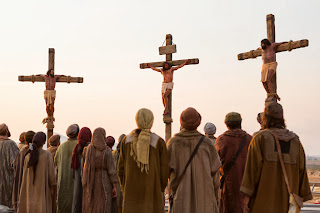Before I continue, let me be clear: the Atonement without a doubt IS a gift given through the grace of God. It is a gift that is freely given, and we in no way deserve or earn it.
That bears repeating: Salvation is a gift given through the grace of Christ.
BUT there is no such thing as passive acceptance of that gift. We can either actively receive the gift or else we are, by default, rejecting it. For Christ to force His gift upon us would be entirely against His nature.* He offers it; we accept or reject it.
 The power of the
Atonement is available and accessible to all, but, just like electrical power, we must choose to flip
the switch. In turning on my light in my room, I would be mistaken to
imply or assume that somehow I was the source of the power that was
producing the light. But I cannot expect to enjoy the light without
putting forth the effort to flip the switch, in other words accepting
the power that is available and waiting.
The power of the
Atonement is available and accessible to all, but, just like electrical power, we must choose to flip
the switch. In turning on my light in my room, I would be mistaken to
imply or assume that somehow I was the source of the power that was
producing the light. But I cannot expect to enjoy the light without
putting forth the effort to flip the switch, in other words accepting
the power that is available and waiting.Christ has revealed that we accept the power of the Atonement into our lives by obeying the laws and ordinances of His gospel; specifically faith, repentance, baptism, receiving the Holy Ghost, and enduring to the end.
Christ makes it clear that only through faith in Him can we be saved. My understanding of faith is that, like love, it is a verb not a feeling. If we truly love someone, we show it through words, actions, gifts, efforts, affections, and time. To quote Shakespeare, "They do not love that do not show their love." I know that this principle extends to faith. To have faith is to act in faith.
The actions that faith naturally lead to are the subsequent laws and ordinances of repentance and baptism. When we really believe in Christ and that He is able to save us, we can't help but desire to purify ourselves from those things that are preventing us from enjoying His full blessings. Thus, we repent, feeling sorrow for our sins and a desire to change and be better. The ordinance of baptism, then, is our way of signifying to Christ--witnessing to Him--of our total commitment to honor and obey Him, to follow His example, to represent Him, and to serve Him.
When we have become clean through repentance and accepted the power of the Atonement to cleanse our lives through baptism, God bestows upon us the gift of the Holy Ghost by the ordinance of the laying on of hands. The Holy Ghost becomes our aid as we complete the final step of enduring to the end, which is, in essence, the repetition and sustaining of the first four steps until the end of our lives. We continually humble ourselves, renewing and building our faith in Christ, repenting daily for our sins and shortcomings, renewing our covenants weekly through the ordinance of the sacrament, keeping ourselves worthy of the companionship of the Holy Ghost, allowing it to work on us and through us as we bring glory to God through our progression.
Without Christ's grace and Atonement, it wouldn't matter how hard I tried, how diligently I went through the motions of faith, repentance, baptism, receiving the Holy Ghost, and enduring to the end, or any other good and essential works. The power would not be there to save; I do not have it within myself to any extent. If there is no electricity running through the wires in my wall, I can turn on and off the light-switch all I want. Still nothing will happen.
But the power is there! Christ did perform the Atonement and He does offer it as a free gift to all. The good news is that we can receive His power into our lives if we so choose! It is available and waiting. Are we willing to act in faith?
*[This brought to mind the fact that our resurrection and immortality ARE in a way forced upon us. It is difficult to imagine anyone NOT wanting to be resurrected, but upon further thought there actually are plenty of people I can think of who might prefer to just become extinct both body and spirit rather than face God on judgement day. So, perhaps that part of the plan is just a requirement which will be seen as a glorious blessing to the righteous and an awful punishment to the wicked, but either way must occur because of the laws of God.]


No comments:
Post a Comment